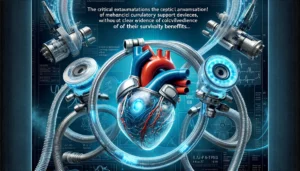
Scrutinizing Mechanical Circulatory Support in Cardiogenic Shock: Have We Jumped the Gun?
This article examines the efficacy of mechanical circulatory support (MCS) systems, like veno-arterial extracorporeal membrane oxygenation (V-A ECMO) and Impella devices, in treating cardiogenic shock (CS). Despite their increasing use and endorsement in ESC and AHA/ACC guidelines based on observational studies, the article highlights a critical gap: the lack of clear mortality benefit from randomized controlled trials. This gap calls for a reassessment of the current evidence supporting MCS in CS, suggesting that enthusiasm for these technologies might have outpaced their proven clinical value. The article advocates for a careful reflection on the existing evidence to better understand the role of MCS in CS management.




